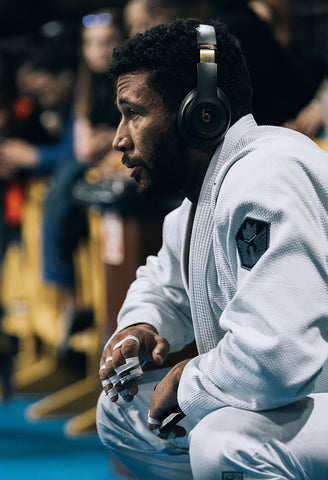How to Design an Effective BJJ Competition Camp
How to Design an Effective BJJ Competition Camp
The 2022 BJJ competition season is well under way. Whether you’ve hit a few jiu-jitsu competitions already this year, or you’re still trying to convince yourself to, foremost on your mind is “am I ready?”
One method in preparing for a competition is to keep doing what you’re doing and hope you can say yes. But what if you arrive to the competition and realize that you are, indeed, not ready? You’ve wasted all those weeks that you could have spent preparing.
Another – arguably better – method is to undergo a “competition camp” in the weeks before the jiu-jitsu competition. Maybe you’re fortunate enough to belong to an academy that has a lot of competitors. In that case, the odds are in your favor that your instructor will put you through some sort of camp.
But what if you don’t have that? And even if you do, there may be some things you can do yourself to make it even better.
Whatever the scenario, here are some tips on designing an effective competition camp to get you ready for that next big – or small – tournament.
Timing of Your BJJ Competition Camp
The timing of your jiu-jitsu competition camp is important. Sure, you can “just go out there” and compete, but if you truly want to “be ready”, you need to give yourself time to prepare.
And while you may see athletes posting about always being ready, that is not the reality. Every major athlete – regardless of sport – needs on and off seasons. To “always be ready” requires training at a level and intensity that is not sustainable in the long run, and could lead to burnout or injuries.
The ideal training camp for jiu-jitsu is typically around eight weeks. Any longer and you risk training fatigue. Any shorter and you’ll find yourself in the taper week before you’ve even found your groove.
Camp Design and Intensity
The reason most of us train jiu-jitsu is because it’s fun. Typically, we don’t step on the mats trying to annihilate our training partners. You might have some you go hard with, and some you just roll with. Some days you flow, and some days you get after it.
Preparing for a jiu-jitsu competition requires a different mindset. As indicated earlier, it demands an increase in the intensity of your training. That doesn’t mean that you start Day One in kill-mode. Your training camp should be more like a parabola (remember algebra, guys)? The intensity should gradually increase, peaking toward week four to six, then start tapering. You should allow a good week of low intensity training and rest prior to your competition to give your body time to recover and feel strong.
There are many ways to design your actual training regimen. First and foremost, it should include rounds that are as realistic to the competition as possible. Start standing. Keep points in mind for a points-based ruleset, or hunt submissions for a sub-only tournament. Rounds should be the same amount of time as you’ll expect in the tournament, so you can get used to pacing yourself or pushing yourself. If there is overtime, train those as well. And drill, drill, drill.
In addition to your time on the mat, add strength and conditioning sessions. This will help keep you from gassing out during your match or matches. Not only that, but it will also help keep you from getting injured during your camp. Add yoga or consistent stretching, to help keep you limber and stave off soreness.
Nutrition and Cutting Weight
During your camp, you’ll be training harder and longer than you’re typically used to. This puts significant nutritional demands on your body.
In general, you’ll be burning more calories, period. So, you’ll need to make sure that you’re properly fueling yourself before and after. If you don’t, you won’t be able to perform your best during training, you’ll struggle to retain information, and you may even risk injury.
Your individual nutritional needs will vary, depending on your body composition, dietary restrictions and activity level. A licensed sports nutritionist will be your best resource to design the optimal nutrition program for you. Of course, if you decide to cut weight for the tournament, this decision will add another factor to the equation. Again, this is something that you should disclose when you consult with a nutritionist. He or she will be able to counsel you on how much you can safely cut, and how, prior to your tournament. A good rule of thumb: don’t attempt to cut more than two pounds a week.
And never, ever forget to keep yourself properly hydrated.
There is no one right way to design your BJJ competition camp, but there are many ways you can get it wrong. With these tips in mind, you’ll be much better prepared to step on that competition mat feeling ready to do your best.


